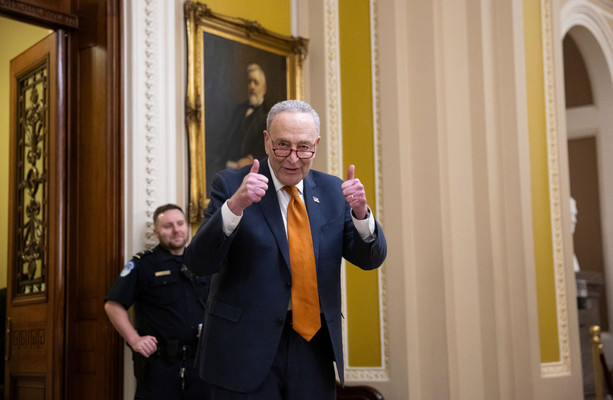Congress averts Government Shutdown in Tense Budget Battle
Table of Contents
In a nail-biting finish, the U.S. Congress narrowly avoided a government shutdown, passing a crucial funding bill just hours before the deadline. The bipartisan agreement,reached after intense negotiations,keeps federal agencies operating and prevents a disruption of essential services.This victory comes as a relief to many Americans concerned about the potential consequences of a shutdown.
The Senate’s approval of the funding measure marked a significant turning point in the protracted budget debate. While the details of the bill are still being scrutinized, its passage prevents a scenario that could have crippled various government functions, from national parks to crucial social programs. The agreement, however, notably excludes a key demand from former President Trump to raise the debt ceiling.
The successful passage of the bill is a testament to the ability of lawmakers to find common ground, even amidst significant political divisions. The process highlighted the high stakes involved in budget negotiations and the potential for widespread disruption if such agreements fail to materialize. The averted shutdown underscores the importance of timely budget approvals and the need for continued dialog between the legislative branches.
While the immediate crisis has been averted, the underlying issues that fueled the tense negotiations remain. The long-term implications of the budget deal and the ongoing debate surrounding the debt ceiling will continue to shape the political landscape in the coming months. The nation watches closely as lawmakers navigate these complex challenges.
Congress Averts Government Shutdown with Last-Minute Spending Deal
In a nail-biting finish, the U.S. Congress narrowly avoided a government shutdown, passing a crucial spending bill just hours before the deadline. The bipartisan agreement, reached after intense negotiations, prevents a disruption of federal services and averts potential economic fallout.
The Senate’s passage of the legislation marked a significant victory for lawmakers who worked tirelessly to find common ground.The bill now heads to President Biden’s desk for his signature, officially averting the crisis.
Details of the Spending Bill
While specific details of the bill are still being analyzed,it’s understood to include funding for various government agencies and programs. The agreement addresses key priorities for both Republicans and Democrats, although compromises were undoubtedly necessary to reach a consensus.
The legislation’s passage comes as a relief to many Americans concerned about the potential consequences of a shutdown. A government shutdown could have resulted in furloughs for federal employees,delays in critical services,and uncertainty in the economy.
Political Fallout and Future Implications
The successful passage of the spending bill is a testament to the ability of Congress to find compromise, even in the face of significant political divisions. However,the close call highlights the ongoing challenges in navigating the complexities of the budget process.
The coming months will likely see continued debate over government spending and priorities. This latest agreement provides a temporary solution, but the underlying issues that led to the near-shutdown remain unresolved and will require further attention from lawmakers.
The successful negotiation and passage of this bill serves as a reminder of the importance of bipartisan cooperation in addressing critical issues facing the nation. The averted shutdown underscores the potential consequences of political gridlock and the need for continued dialogue and compromise.

Congress Narrowly Averts Shutdown: A Look at the Last-Minute Deal
The United States Congress managed to avoid a potentially disastrous government shutdown in the eleventh hour, passing a crucial spending bill just before the deadline. This agreement, reached after intense bipartisan negotiations, has breathed a sigh of relief thru many Americans who feared the wide-ranging consequences of a shutdown.
This interview explores the details of this close call, the underlying budgetary issues, and what this all means for the future of American governance with Dr. Emily Carter, a renowned political science professor specializing in congressional budget negotiations.
the Brink of Shutdown: What Happened?
Senior Editor: Dr.Carter,we were just hours away from a government shutdown. Can you walk us through what led to this near-crisis?
Dr. Emily Carter: Certainly. This year’s budget debate was particularly contentious. We saw sharp disagreements between the parties on spending priorities and a reluctance to compromise. This brought us dangerously close to a shutdown, which would have meant furloughs for federal employees, delays in vital services, and a potential negative impact on the economy.
The Bipartisan Agreement: A Win for Compromise?
Senior Editor: Thankfully, a deal was reached. what are the key takeaways from this bipartisan agreement?
Dr. Emily Carter: This agreement showcases the ability of lawmakers to find common ground even in a deeply polarized surroundings. It addresses key priorities for both Republicans and Democrats,acknowledging the need for compromise in governing. While the specifics are still being analyzed, it appears that the bill funds essential government agencies and programs, preventing a disruption of critical services.
Debt Ceiling Excluded: What does This Mean?
Senior Editor: Notably absent from the agreement is a provision to raise the debt ceiling. What are the implications of this omission?
Dr. Emily Carter: This is a critically important progress. The debt ceiling issue remains a major point of contention. By excluding it from this spending bill, lawmakers have essentially kicked the can down the road, hoping to address this pressing problem at a later date. This only postpones a potentially even more significant crisis down the line.
Looking Ahead: What Lessons Were Learned?
Senior Editor: What lessons can be drawn from this near-shutdown experience?
Dr. Emily Carter: This close call underscores the importance of timely and responsible budget approvals. It also highlights the need for continued dialog and collaboration between the legislative branches. The stakes are simply too high to allow political gridlock to threaten essential government services and the stability of our economy.
